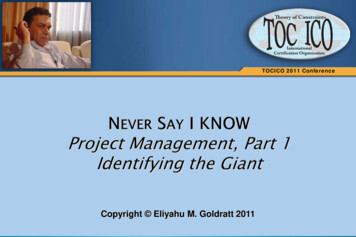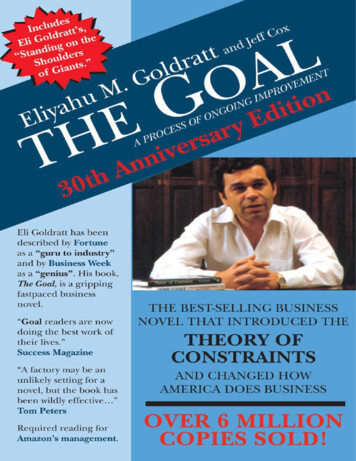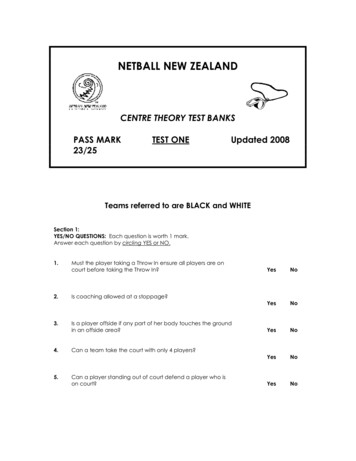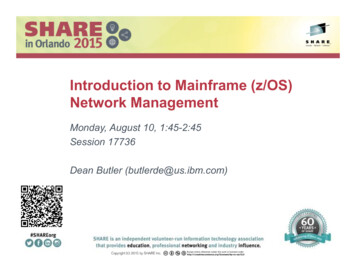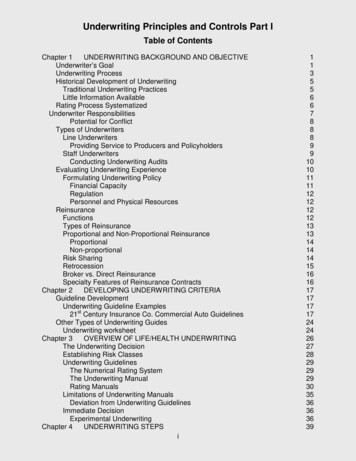
Transcription
Captured by Plamen T.
THE GOALA Process of Ongoing ImprovementTHIRD REVISED EDITIONByEliyahu M. GoldrattandJeff CoxWith interviews by David Whitford,Editor at Large, Fortune Small BusinessNorth River PressCaptured by Plamen T.
Additional copies can be obtained from your localbookstore or the publisher:The North River PressPublishing CorporationP.O. Box 567Great Barrington, MA 01230(800) 486-2665 or (413) 528-0034www.northriverpress.comFirst Edition Copyright 1984 Eliyahu M. GoldrattRevised Edition Copyright 1986 Eliyahu M. GoldrattSecond revised Edition 1992 Eliyahu M. GoldrattThird Revised Edition 2004 Eliyahu M. GoldrattAll rights reserved. No part of this book may be reproduced or utilized in any formor by any means, electronic or mechanical, including photocopying, recording, orany information storage retrieval system, without permission in writing from thepublisherManufactured in the United States of AmericaLibrary of Congress Cataloging-in-Publication DataGoldratt, Eliyahu M., 1948The goal: a process of ongoing improvementI. Coxjeff, 1951-. II. TitlePR9510.9.G64G61986 823ISBN: 0-88427-178-186-12566Captured by Plamen T.
1INTRODUCTIONThe Goal is about science and education. I believe that thesetwo words have been abused to the extent that their originalmeanings have been lost in a fog of too much respect and mystery. Science for me, and for the vast majority of respectable scientists, is not about the secrets of nature or even about truths.Science is simply the method we use to try and postulate a minimum set of assumptions that can explain, through a straightforward logical derivation, the existence of many phenomena of nature.The Law of Conservation of Energy of physics is not truth. Itis just an assumption that is valid in explaining a tremendousamount of natural phenomena. Such an assumption can never beproven since even an infinite number of phenomena that can beexplained by it does not prove its universal application. On theother hand, it can be disproved by just a single phenomenon thatcannot be explained by the assumption. This disproving does notdetract from the validity of the assumption. It just highlights theneed or even the existence of another assumption that is morevalid. This is the case with the assumption of the conservation ofenergy which was replaced by Einstein's more global-more valid-postulation of the conservation of energy and mass. Einstein'sassumption is not true to the same extent that the previous onewas not "true".Somehow we have restricted the connotation of science to avery selective, limited assemblage of natural phenomena. We refer to science when we deal with physics, chemistry or biology.We should also realize that there are many more phenomena ofnature that do not fall into these categories, for instance thosephenomena we see in organizations, particularly those in industrial organizations. If these phenomena are not phenomena ofnature, what are they? Do we want to place what we see in organizations to the arena of fiction rather than into reality?E.M. GoldrattThe Goal: A Process of Ongoing ImprovementCaptured by Plamen T.
2This book is an attempt to show that we can postulate a verysmall number of assumptions and utilize them to explain a verylarge spectrum of industrial phenomena. You the reader canjudge whether or not the logic of the book's derivation from itsassumptions to the phenomena we see daily in our plants is soflawless that you call it common sense. Incidentally, commonsense is not so common and is the highest praise we give to achain of logical conclusions. If you do, you basically have takenscience from the ivory tower of academia and put it where itbelongs, within the reach of every one of us and made it applicable to what we see around us.What I have attempted to show with this book is that noexceptional brain power is needed to construct a new science orto expand on an existing one. What is needed is just the courageto face inconsistencies and to avoid running away from them justbecause "that's the way it was always done". I dared to interweaveinto the book a family life struggle, which I assume is quite familiar to any manager who is to some extent obsessed with his work.This was not done just to make the book more popular, but tohighlight the fact that we tend to disqualify many phenomena ofnature as irrelevent as far as science is concerned.I have also attempted to show in the book the meaning ofeducation. I sincerely believe that the only way we can learn isthrough our deductive process. Presenting us with final conclusions is not a way that we learn. At best it is a way that we aretrained. That's why I tried to deliver the message contained inthe book in the Socratic way. Jonah, in spite of his knowledge ofthe solutions, provoked Alex to derive them by supplying thequestion marks instead of the exclamation marks. I believe thatbecause of this method, you the reader will deduce the answerswell before Alex Rogo succeeds in doing so. If you find the bookentertaining maybe you will agree with me that this is the way toeducate, this is the way we should attempt to write our textbooks.Our textbooks should not present us with a series of end resultsbut rather a plot that enables the reader to go through the deduction process himself. If I succeed by this book to change somewhat your perception of science and education, this is my truereward.E.M. GoldrattThe Goal: A Process of Ongoing ImprovementCaptured by Plamen T.
3INTRODUCTION TOTHE FIRST EDITION"The Goal" is about New global principles of manufacturing.It's about people trying to understand what makes their worldtick so that they can make it better. As they think logically andconsistently about their problems they are able to determine"cause and effect" relationships between their actions and theresults. In the process they deduce some basic principles whichthey use to save their plant and make it successful.I view science as nothing more than an understanding of theway the world is and why it is that way. At any given time ourscientific knowledge is simply the current state of the art of ourunderstanding. I do not believe in absolute truths. I fear suchbeliefs because they block the search for better understanding.Whenever we think we have final answers progress, science, andbetter understanding ceases. Understanding of our world is notsomething to be pursued for its own sake, however. Knowledgeshould be pursued, I believe, to make our world better—to makelife more fulfilling.There are several reasons I chose a novel to explain my understanding of manufacturing—how it works (reality) and why itworks that way. First, I want to make these principles more understandable and show how they can bring order to the chaosthat so often exists in our plants. Second, I wanted to illustratethe power of this understanding and the benefits it can bring.The results achieved are not fantasy; they have been, and arebeing, achieved in real plants. The western world does not haveto become a second or third rate manufacturing power. If we justunderstand and apply the correct principles, we can competewith anyone. I also hope that readers would see the validity andvalue of these principles in other organizations such as banks,hospitals, insurance companies and our families. Maybe the samepotential for growth and improvement exists in all organizations.Finally, and most importantly, I wanted to show that we canE.M. GoldrattThe Goal: A Process of Ongoing ImprovementCaptured by Plamen T.
4all be outstanding scientists. The secret of being a good scientist, Ibelieve, lies not in our brain power. We have enough. We simplyneed to look at reality and think logically and precisely aboutwhat we see. The key ingredient is to have the courage to faceinconsistencies between what we see and deduce and the waythings are done. This challenging of basic assumptions is essentialto breakthroughs. Almost everyone who has worked in a plant isat least uneasy about the use of cost accounting efficiencies tocontrol our actions. Yet few have challenged this sacred cow directly. Progress in understanding requires that we challenge basicassumptions about how the world is and why it is that way. If wecan better understand our world and the principles that governit, I suspect all our lives will be better.Good luck in your search for these principles and for your ownunderstanding of "The Goal."E.M. GoldrattThe Goal: A Process of Ongoing ImprovementCaptured by Plamen T.
5ABOUT THE AUTHORDr. Eli Goldratt's book, The Goal has been a best seller since1984 and is recognized as one of the best-selling managementbooks of all time. Recently, the Japanese edition of The Goalsold over 500,000 copies in less than one year after being released.Eli Goldratt is the author of many other books including thebusiness novels, It's Not Luck (the sequel to The Goal), Critical Chain, and Necessary but Not Sufficient. His books have beenIranslated into 27 languages and sales have exceeded 6 millioncopies worldwide. His latest book is, Necessary but Not Sufficient,which focuses on the low rate of return obtained by companieson their huge investments in IT and enterprise resource planning (ERP) systems.Eli Goldratt is the founder of TOC for education; a non-profitorganization dedicated to bringing TOC thinking and tools toteachers and their students (www.tocforeducation.com). Dr.Goldratt currently spends his time promoting TOC for Education and The Goldratt Group while he continues to write,lecture and consult.For more information on Eli Goldratt and his current projectsvisit his web site at: www.eligoldratt.com.E.M. GoldrattThe Goal: A Process of Ongoing ImprovementCaptured by Plamen T.
6THE GOALTHIRD REVISED EDITIONE.M. GoldrattThe Goal: A Process of Ongoing ImprovementCaptured by Plamen T.
71I come through the gate this morning at 7:30 and I can see itfrom across the lot: the crimson Mercedes. It's parked beside theplant, next to the offices. And it's in my space. Who else would dothat except Bill Peach? Never mind that the whole lot is practically empty at that hour. Never mind that there are spacesmarked "Visitor." No, Bill's got to park in the space with my titleon it. Bill likes to make subtle statements. So, okay, he's the division vice-president, and I'm just a mere plant manager. I guesshe can park his damn Mercedes wherever he wants.I put my Mazda next to it (in the space marked "Controller").A glance at the license as I walk around it assures me it has to beBill's car because the plate says "NUMBER 1." And, as we allknow, that's absolutely correct in terms of who Bill always looksout for. He wants his shot at CEO. But so do I. Too bad that Imay never get the chance now.Anyway, I'm walking up to the office doors. Already theadrenalin is pumping. I'm wondering what the hell Bill is doinghere. I've lost any hope of getting any work done this morning. Iusually go in early to catch up on all the stuff I'm too busy to doduring the day, because I can really get a lot done before thephone rings and the meetings start, before the fires break out.But not today."Mr. Rogo!" I hear someone calling.I stop as four people come bursting out of a door on the sideof the plant. I see Dempsey, the shift supervisor; Martinez, theunion steward; some hourly guy; and a machining center foreman named Ray. And they're all talking at the same time. Dempsey is telling me we've got a problem. Martinez is shouting abouthow there is going to be a walkout. The hourly guy is sayingsomething about harassment. Ray is yelling that we can't finishsome damn thing because we don't have all the parts. SuddenlyI'm in the middle of all this. I'm looking at them; they're lookingat me. And I haven't even had a cup of coffee yet.When I finally get everyone calmed down enough to askwhat's going on, I learn that Mr. Peach arrived about an hourbefore, walked into my plant, and demanded to be shown thestatus of Customer Order Number 41427.E.M. GoldrattThe Goal: A Process of Ongoing ImprovementCaptured by Plamen T.
8Well, as fate would have it, nobody happened to know aboutCustomer Order 41427. So Peach had everybody stepping andfetching to chase down the story on it. And it turns out to be afairly big order. Also a late one. So what else is new? Everythingin this plant is late. Based on observation, I'd say this plant hasfour ranks of priority for orders: Hot . . . Very Hot . . . RedHot . . . and Do It NOW! We just can't keep ahead of anything.As soon as he discovers 41427 is nowhere close to beingshipped, Peach starts playing expeditor. He's storming around,yelling orders at Dempsey. Finally it's determined almost all theparts needed are ready and waiting—stacks of them. But theycan't be assembled. One part of some sub-assembly is missing; itstill has to be run through some other operation yet. If the guysdon't have the part, they can't assemble, and if they can't assemble, naturally, they can't ship.They find out the pieces for the missing subassembly aresitting over by one of the n/c machines, where they're waitingtheir turn to be run. But when they go to that department, theyfind the machinists are not setting up to run the part in question,but instead some other do-it-now job which somebody imposedupon them for some other product.Peach doesn't give a damn about the other do-it-now job. Allhe cares about is getting 41427 out the door. So he tells Dempseyto direct his foreman, Ray, to instruct his master machinist toforget about the other super-hot gizmo and get ready to run themissing part for 41427. Whereupon the master machinist looksfrom Ray to Dempsey to Peach, throws down his wrench, andtells them they're all crazy. It just took him and his helper anhour and a half to set up for the other part that everyone neededso desperately. Now they want to forget about it and set up forsomething else instead? The hell with it! So Peach, always thediplomat, walks past my supervisor and my foreman, and tells themaster machinist that if he doesn't do what he's told, he's fired.More words are exchanged. The machinist threatens to walk offthe job. The union steward shows up. Everybody is mad. Nobodyis working. And now I've got four upset people greeting mebright and early in front of an idle plant."So where is Bill Peach now?" I ask."He's in your office," says Dempsey."Okay, would you go tell him I'll be in to talk to him in aminute," I ask.E.M. GoldrattThe Goal: A Process of Ongoing ImprovementCaptured by Plamen T.
9Dempsey gratefully hurries toward the office doors. I turn toMartinez and the hourly guy, who I discover is the machinist. Itell them that as far as I'm concerned there aren't going to be anyfirings or suspensions—that the whole thing is just a misunderstanding. Martinez isn't entirely satisfied with that at first, and themachinist sounds as if he wants an apology from Peach. I'm notabout to step into that one. I also happen to know that Martinezcan't call a walkout on his own authority. So I say if the unionwants to file a grievance, okay; I'll be glad to talk to the localpresident, Mike O'Donnell, later today, and we'll handle everything in due course. Realizing he can't do anything more beforetalking to O'Donnell anyway, Martinez finally accepts that, andhe and the hourly guy start walking back to the plant."So let's get them back to work," I tell Ray."Sure, but uh, what should we be working on?" asks Ray."The job we're set up to run or the one Peach wants?""Do the one Peach wants," I tell him."Okay, but we'll be wasting a set-up," says Ray."So we waste it!" I tell him. "Ray, I don't even know what thesituation is. But for Bill to be here, there must be some kind ofemergency. Doesn't that seem logical?""Yeah, sure," says Ray. "Hey, I just want to know what todo.""Okay, I know you were just caught in the middle of all this,"I say to try to make him feel better. "Let's just get that setup doneas quick as we can and start running that part.""Right," he says.Inside, Dempsey passes me on his way back to the plant. He'sjust come from my office and he looks like he's in a hurry to getout of there. He shakes his head at me."Good luck," he says out of the corner of his mouth.The door to my office is wide open. I walk in, and there he is.Bill Peach is sitting behind my desk. He's a stocky, barrel-chestedguy with thick, steely-gray hair and eyes that almost match. As Iput my briefcase down, the eyes are locked onto me with a lookthat says This is your neck, Rogo."Okay, Bill, what's going on?" I ask.He says, "We've got things to talk about. Sit down."I say, "I'd like to, but you're in my seat."It may have been the wrong thing to say.E.M. GoldrattThe Goal: A Process of Ongoing ImprovementCaptured by Plamen T.
10"You want to know why I'm here?" he says. "I'm here to saveyour lousy skin."I tell him, "Judging from the reception I just got, I'd sayyou're here to ruin my labor relations."He looks straight at me and says, "If you can't make somethings happen around here, you're not going to have any labor toworry about. Because you're not going to have this plant to worryabout. In fact, you may not have a job to worry about, Rogo.""Okay, wait a minute, take it easy," I say. "Let's just talkabout it. What's the problem with this order?"First of all, Bill tells me that he got a phone call last night athome around ten o'clock from good old Bucky Burnside, president of one of UniCo's biggest customers. Seems that Bucky washaving a fit over the fact that this order of his (41427) is sevenweeks late. He proceeded to rake Peach over the coals for aboutan hour. Bucky apparently had gone out on a limb to sway theorder over to us when everybody was telling him to give thebusiness to one of our competitors. He had just had dinner withseveral of his customers, and they had dumped all over him because their orders were late—which, as it happens, was because ofus. So Bucky was mad (and probably a little drunk). Peach wasable to pacify him only by promising to deal with the matterpersonally and by guaranteeing that the order would be shippedby the end of today, no matter what mountains had to be moved.I try to tell Bill that, yes, we were clearly wrong to have letthis order slide, and I'll give it my personal attention, but did hehave to come in here this morning and disrupt my whole plant?So where was I last night, he asks, when he tried to call me athome? Under the circumstances, I can't tell him I have a personallife. I can't tell him that the first two times the phone rang, I let itring because I was in the middle of a fight with my wife, which,oddly enough, was about how little attention I've been giving her.And the third time, I didn't answer it because we were makingup.I decide to tell Peach I was just late getting home. He doesn'tpress the issue. Instead, he asks how come I don't know what'sgoing on inside my own plant. He's sick and tired of hearingcomplaints about late shipments. Why can't I stay on top ofthings?"One thing I do know," I tell him, "is that after the secondround of layoffs you forced on us three months ago, along withE.M. GoldrattThe Goal: A Process of Ongoing ImprovementCaptured by Plamen T.
11the order for a twenty percent cutback, we're lucky to get anything out the door on time.""Al," he says quietly, "just build the damn products. Youhear me?""Then give me the people I need!" I tell him."You've got enough people! Look at your efficiencies, forgod's sake! You've got room for improvement, Al," he says."Don't come crying to me about not enough people until youshow me you can effectively use what you've got."I'm about to say something when Peach holds up his handfor me to shut my mouth. He stands up and goes over to close thedoor. Oh shit, I'm thinking.He turns by the door and tells me, "Sit down."I've been standing all this time. I take a seat in one of thechairs in front of the desk, where a visitor would sit. Peach returns behind the desk."Look, Al, it's a waste of time to argue about this. Your lastoperations report tells the story," says Peach.I say, "Okay, you're right. The issue is getting Burnside'sorder shipped—"Peach explodes. "Dammit, the issue is not Burnside's order!Burnside's order is just a symptom of the problem around here.Do you think I'd come down here just to expedite a late order?Do you think I don't have enough to do? I came down here tolight a fire under you and everybody else in this plant. This isn'tjust a matter of customer service. Your plant is losing money."He pauses for a moment, as if he had to let that sink in. Then—bam—he pounds his fist on the desk top and points his fingerat me."And if you can't get the orders out the door," he continues,"then I'll show you how to do it. And if you still can't do it, thenI've got no use for you or this plant.""Now wait a minute, Bill—""Dammit, I don't have a minute!" he roars. "I don't havetime for excuses anymore. And I don't need explanations. I needperformance. I need shipments. I need income!""Yes, I know that, Bill.""What you may not know is that this division is facing theworst losses in its history. We're falling into a hole so deep we maynever get out, and your plant is the anchor pulling us in."I feel exhausted already. Tiredly I ask him, "Okay, what doE.M. GoldrattThe Goal: A Process of Ongoing ImprovementCaptured by Plamen T.
12you want from me? I've been here six months. I admit it's gottenworse instead of better since I've been here. But I'm doing thebest I can.""If you want the bottom line, Al, this is it: You've got threemonths to turn this plant around," Peach says."And suppose it can't be done in that time?" I ask."Then I'm going to go to the management committee with arecommendation to close the plant," he says.I sit there speechless. This is definitely worse than anything Iexpected to hear this morning. And, yet, it's not really that surprising. I glance out the window. The parking lot is filling withthe cars of the people coming to work first shift. When I lookback, Peach has stood up and is coming around the desk. He sitsdown in the chair next to me and leans forward. Now comes thereassurance, the pep talk."Al, I know that the situation you inherited here wasn't thebest. I gave you this job because I thought you were the one whocould change this plant from a loser to . well, a small winnerat least. And I still think that. But if you want to go places in thiscompany, you've got to deliver results.""But I need time, Bill.""Sorry, you've got three months. And if things get muchworse, I may not even be able to give you that."I sit there as Bill glances at his watch and stands up, discussion ended.He says, "If I leave now, I'll only miss my first meeting."I stand up. He walks to the door.Hand on the knob, he turns and says with a grin, "Now thatI've helped you kick some ass around here, you won't have anytrouble getting Bucky's order shipped for me today, will you?""We'll ship it, Bill," I say."Good," he says with wink as he opens the door.A minute later, I watch from the window as he gets into hisMercedes and drives toward the gate.Three months. That's all I can think about.I don't remember turning away from the window. I don'tknow how much time has passed. All of a sudden, I'm aware thatI'm sitting at my desk and I'm staring into space. I decide I'dbetter go see for myself what's happening out in the plant. Fromthe shelf by the door, I get my hard hat and safety glasses andhead out. I pass my secretary.E.M. GoldrattThe Goal: A Process of Ongoing ImprovementCaptured by Plamen T.
13"Fran, I'll be out on the floor for a little while," I tell her as Igo by.Fran looks up from a letter she's typing and smiles."Okey-dokey," she says. "By the way, was that Peach's car Isaw in your space this morning?""Yes, it was.""Nice car," she says and she laughs. "I thought it might beyours when I first saw it."Then I laugh. She leans forward across the desk."Say, how much would a car like that cost?" she asks."I don't know exactly, but I think it's around sixty thousanddollars," I tell her.Fran catches her breath. "You're kidding me! That much? Ihad no idea a car could cost that much. Wow. Guess I won't betrading in my Chevette on one of those very soon."She laughs and turns back to her typing.Fran is an "okey-dokey" lady. How old is she? Early fortiesI'd guess, with two teen-aged kids she's trying to support. Herex-husband is an alcoholic. They got divorced a long time ago. . . since then, she's wanted nothing to do with a man. Well,almost nothing. Fran told me all this herself on my second day atthe plant. I like her. I like her work, too. We pay her a good wage. at least we do now. Anyway, she's still got three months.Going into the plant is like entering a place where satans andangels have married to make kind of a gray magic. That's what italways feels like to me. All around are things that are mundaneand miraculous. I've always found manufacturing plants to befascinating places—even on just a visual level. But most peopledon't see them the way I do.Past a set of double doors separating the office from theplant, the world changes. Overhead is a grid of lamps suspendedfrom the roof trusses, and everything is cast in the warm, orangehues of sodium-iodine light. There is a huge chain-link cagewhich has row after row of floor-to-roof racks loaded with binsand cartons filled with parts and materials for everything wemake. In a skinny aisle between two racks rides a man in thebasket of a forklift crane that runs along a track on the ceiling.Out on the floor, a reel of shiny steel slowly unrolls into themachine that every few seconds says "Ca-chunk."Machines. The plant is really just one vast room, acres ofi-pace. filled with machines. They are organized in blocks and theE.M. GoldrattThe Goal: A Process of Ongoing ImprovementCaptured by Plamen T.
14blocks are separated by aisles. Most of the machines are paintedin solid March Gras colors—orange, purple, yellow, blue. Fromsome of the newer machines, ruby numbers shine from digitaldisplays. Robotic arms perform programs of mechanical dance.Here and there, often almost hidden among the machines,are the people. They look over as I walk by. Some of them wave; Iwave back. An electric cart whines past, an enormous fat guydriving it. Women at long tables work with rainbows of wire. Agrimy guy in amorphous coveralls adjusts his face mask andignites a welding torch. Behind glass, a buxom, red-hairedwoman pecks the keys on a computer terminal with an amberdisplay.Mixed with the sights is the noise, a din with a continuousunderlying chord made by the whirr of fans, motors, the air inthe ventilators—it all sounds like an endless breath. At randomcomes a BOOM of something inexplicable. Behind me ring thealarm bells of an overhead crane rumbling up its track. Relaysclick. The siren sounds. From the P.A. system, a disembodiedvoice talks like God, intermittently and incomprehensibly, overeverything.Even with all that noise, I hear the whistle. Turning, I see theunmistakable shape of Bob Donovan walking up the aisle. He'ssome distance away. Bob is what you might call a mountain of aman, standing as he does at six-foot-four. He weighs in at about250 pounds, a hefty portion of which is beer gut. He isn't theprettiest guy in the world . I think his barber was trained bythe Marines. And he doesn't talk real fancy; I suspect it's a pointof pride with him. But despite a few rough edges, which heguards closely, Bob is a good guy. He's been production managerhere for nine years. If you need something to happen, all you dois talk to Bob and if it can be done, it will be by the next time youmention it.It takes a minute or so for us to reach each other. As we getcloser, I can see he isn't very cheerful. I suppose it's mutual."Good morning," says Bob."I'm not sure what's good about it," I say. "Did you hearabout our visitor?""Yeah, it's all over the plant," says Bob."So I guess you know about the urgency for shipping a certain order number 41427?" I ask him.E.M. GoldrattThe Goal: A Process of Ongoing ImprovementCaptured by Plamen T.
15He starts to turn red. "That's what I need to talk to youabout.""Why? What's up?""I don't know if word reached you yet, but Tony, that mastermachinist Peach yelled at, quit this morning," says Bob."Aw, shit," I mutter."I don't think I have to tell you that guys like that are not adime a dozen. We're going to have a tough time finding a replacement," says Bob."Can we get him back?""Well, we may not want him back," says Bob. "Before hequit, he did the set-up that Ray told him to do, and put themachine on automatic to do its run. The thing is, he didn'ttighten two of the adjusting nuts. We got little bits of machine toolall over the floor now.""How many parts do we have to scrap?""Well, not that many. It only ran for a little while.""Will we have enough to fill that order?" I ask him."I'll have to check," he says. "But, see, the problem is thatthe machine itself is down and it may stay down for some time.""Which one is it?" I ask."The NCX-10," he says.I shut my eyes. It's like a cold hand just reached inside meand grabbed the bottom of my stomach. That machine is the onlyone of its type in the plant. I ask Bob how bad the damage is. Hesays, "I don't know. They've got the thing half torn apart outthere. We're on the phone with the manufacturer right now."I start walking fast. I want to see it for myself. God, are we introuble. I glance over at Bob, who is keeping pace with me."Do you think it was sabotage?" I ask.Bob seems surprised. "Well, I can't say. I think the guy wasjust so upset he couldn't think straight. So he screwed it up."I can feel my face getting hot. The cold hand is gone. NowI'm so pissed off at Bill Peach that I'm fantasizing about callinghim on the phone and screaming in his ear. It's his fault! And inmy head I see him. I see him behind my desk and hear himtelling me how he's going to show m
Dr. Eli Goldratt's book, The Goal . has been a best seller since 1984 and is recognized as one of the best-selling management books of all time. Recently, the Japanese edition of . The Goal . sold over 500,000 copies in less than one year after being re- leased. Eli Goldratt is the author of
